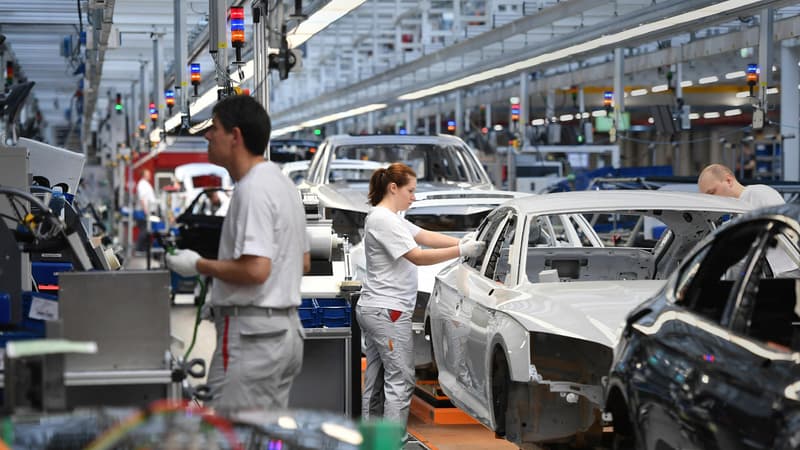Nothing goes to the City of Ingolstadt, Germany. The accounts of the prosperous Bavarian appointment of 145,000 inhabitants, the headquarters of the prestigious Audi manufacturer, are red. “We face a dramatic situation, historically difficult,” warns the mayor, Michael Kern, in a statement. For the first time, Ingolstadt will present a deficit budget in 2026. An anomaly in a city where unemployment does not exist (3.2%), and where GDP per capita (76,430 euros) is almost double the European average (39,680 euros) according to official data.
In question: the collapse of fiscal income. “The professional tax, for a long time the main source of income, has been divided by two. Instead of about 150 million euros in annual revenues required, only 55 million euros must be collected in 2025,” says the City Council. Compared to the peak of the 2010, the resources of the professional tax even decreased by 70%.
The explanation is located on the Audi side, whose city depends closely, to the point that sometimes the “city of Audi” is called. The manufacturer employs 40,000 people in Ingolstadt, whose population has grown as the “brand with four rings” has developed. However, last year, he saw that his sales changed 12% and the margins contracted.
In August 2025, Audi’s records in the EU again fell 3% compared to last year according to the latest data in ACEA (European Automobile Association). Trapped in the throat, Audi and their Matriz Volkswagen company have announced positions of positions -35,000 by 2030.
In this context, Volkswagen pays less professional taxes than before. Above all, the group centralizes its taxes in the city where its own seat is located, Wolfsburg, 500 kilometers north of Ingolstadt, which is therefore helpless. The “city of Audi”, an emblem of the gleaming Germany of Merkel’s years, has become a symbol of the country’s economic difficulties, caught in quasi-staining, unprecedented from reunification.
In mid -September, the mayor informed its citizens that the city would have to save between 60 and 80 million euros per year, twice as expected. Evaluation: Expenses are frozen, the renewal of schools can be postponed, such as the urgent modernization of the theater of the municipality. The inhabitants also fear when they see the taxes rise, says the Süddeutsche Zeitung, the great Bavarian newspaper.
Ingolstadt’s case is not isolated. Munich, the largest city in Bavaria, also announced a decrease of 90 million euros in professional tax revenues. In total, 37% of the 100 largest German cities cannot present a balanced budget, according to a study by the Association of German cities. And almost half are forced to extract from their financial reserves, a disaster in the country of budgetary rigor.
“Chinese shock”
Therefore, deceleration in the German economy places German communities under high pressure. And depression could last. If the causes are multiple, some economists connect Ingolstadt’s difficulties with the deep changes in progress in China.
Audi sales in Middle Empire, their first market, went down last year, while consumers are becoming more and more towards local brands. Between January and June, exports of German cars and spare parts to China have unbridled 36% according to the German Economic Institute (IW).
In the first eight months of 2025, Germany’s commercial deficit against China increased by 144% compared to last year, from $ 7,125 billion to $ 17,431 billion, according to the latest data Chinese customs. While German exports to China continuously continued to Cavid-19 pandemic, this dynamic was suddenly invested. And at the same time, Germany and European countries matter more and more Chinese products, including cars.
In August, the accumulated sales of Chinese manufacturers exceeded those of Audi or Renault according to Reuters. Chinese industrialists are not only reducing the market share of their competitors in export, but also begin to stain their markets within the European Union.
The hope of a rebound in 2026
The German economic model, ordered to industrial exports, can be widely questioned by the Chinese competitiveness clash, which threatens many European industrial sectors, starting with the car. The Gross Domestic Product (GDP) again unscrewed in the second quarter (-0.3%), while industrial production was lower than the forecasts of Destatis, the statistics office.
The German industry is also permanently sealed by high energy prices, especially since the loss of Russian gas in which companies had built part of their competitiveness. To connect with growth, the government directed by Friedrich Merz has promised a great investment plan. Companies will be backed by a value reduction package worth 46 billion euros. The German German economic institutes anticipate a rebound next year.
Source: BFM TV


